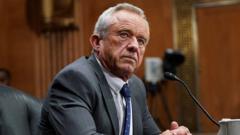In a close and partisan vote, Kennedy's nomination has moved to a full Senate vote, reflecting deep divisions over his controversial health positions.
RFK Jr's Senate Confirmation: A Step Towards Controversial Health Leadership

RFK Jr's Senate Confirmation: A Step Towards Controversial Health Leadership
Robert F. Kennedy Jr. advances through his Senate nomination for Health Secretary, igniting debate over his views on vaccines and public health oversight.
Robert F. Kennedy Jr. has secured his first major victory in his bid to become the U.S. Secretary of Health, with a Senate committee approving his nomination amidst a swirl of controversy regarding his views on vaccination and public health. In a narrow 14-13 vote, the Senate Finance Committee showed a stark partisan divide, with all Republican members voting in favor of Kennedy, a known vaccine skeptic, while Democrats raised serious concerns.
Kennedy, who ended his presidential campaign to endorse Donald Trump, faced tough inquiries from Senators regarding his qualifications and controversial past statements about vaccines. He asserted that he does not oppose vaccinations or endorse conspiracy theories, advocating instead for enhanced safety tests for vaccines. However, senators pointed to his previous remarks, including a podcast interview where he stated, "There's no vaccine that is safe and effective," raising doubts about his commitment to evidence-based public health policies.
Among his critics was Senator Bernie Sanders, who acknowledged Kennedy's campaign slogan "Make America Healthy Again" but highlighted the troubling legacy of anti-vaccine rhetoric associated with Kennedy's former organization, Children's Health Defence. During the hearings, Sanders presented images of baby clothing adorned with anti-vaccine messages, prompting Kennedy to clarify that he is no longer responsible for the organization’s activities.
Despite being unable to sway any Democrats to support his nomination, Kennedy did gain crucial backing from Louisiana Republican Senator Bill Cassidy, who previously expressed reservations. Cassidy revealed he was convinced by Kennedy’s assurances and the commitments made to the White House, paving the way for the nomination to go to a full Senate vote.
Kennedy, an heir to a prominent political legacy, is poised to take charge of several major health agencies, including the CDC and FDA. He has signalled plans to overhaul these organizations, focusing on food safety and health reforms rather than implementing extreme policies against vaccinations or fast food. His confirmation could have profound implications for public health strategies in the U.S., particularly concerning the regulation of food additives and consumer health protections. As the full Senate vote approaches, the nation watches closely, weighing the responsibilities of health leadership against Kennedy's contentious past.





















